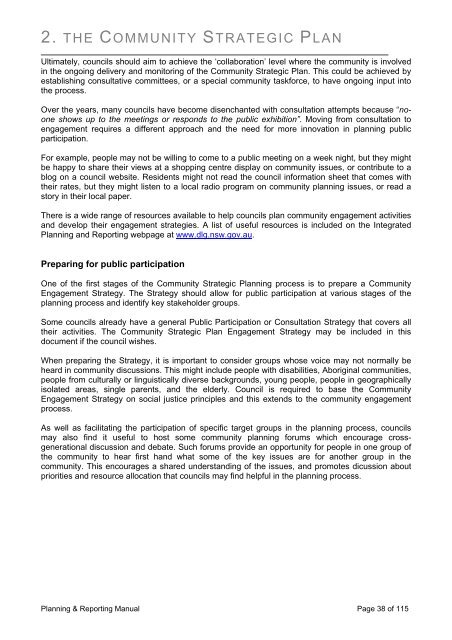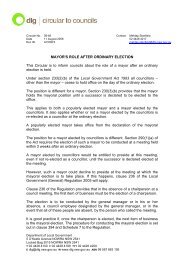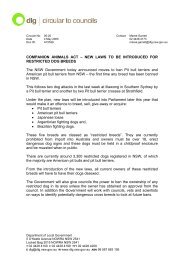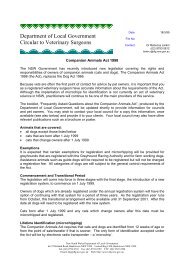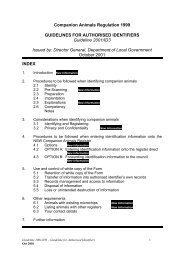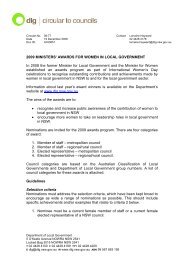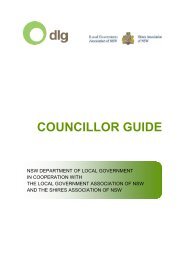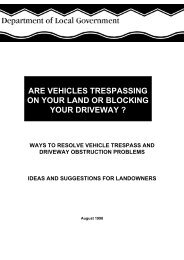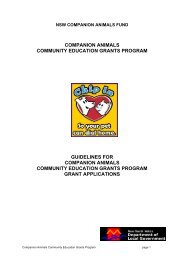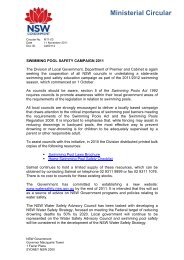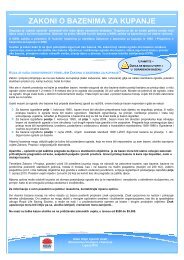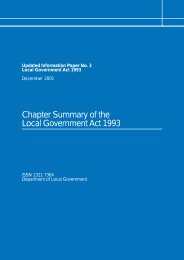Integrated Planning and Reporting Manual - Division of Local ...
Integrated Planning and Reporting Manual - Division of Local ...
Integrated Planning and Reporting Manual - Division of Local ...
Create successful ePaper yourself
Turn your PDF publications into a flip-book with our unique Google optimized e-Paper software.
2. THE COMMUNITY STRATEGIC PLAN<br />
Ultimately, councils should aim to achieve the ‘collaboration’ level where the community is involved<br />
in the ongoing delivery <strong>and</strong> monitoring <strong>of</strong> the Community Strategic Plan. This could be achieved by<br />
establishing consultative committees, or a special community taskforce, to have ongoing input into<br />
the process.<br />
Over the years, many councils have become disenchanted with consultation attempts because “noone<br />
shows up to the meetings or responds to the public exhibition”. Moving from consultation to<br />
engagement requires a different approach <strong>and</strong> the need for more innovation in planning public<br />
participation.<br />
For example, people may not be willing to come to a public meeting on a week night, but they might<br />
be happy to share their views at a shopping centre display on community issues, or contribute to a<br />
blog on a council website. Residents might not read the council information sheet that comes with<br />
their rates, but they might listen to a local radio program on community planning issues, or read a<br />
story in their local paper.<br />
There is a wide range <strong>of</strong> resources available to help councils plan community engagement activities<br />
<strong>and</strong> develop their engagement strategies. A list <strong>of</strong> useful resources is included on the <strong>Integrated</strong><br />
<strong>Planning</strong> <strong>and</strong> <strong>Reporting</strong> webpage at www.dlg.nsw.gov.au.<br />
Preparing for public participation<br />
One <strong>of</strong> the first stages <strong>of</strong> the Community Strategic <strong>Planning</strong> process is to prepare a Community<br />
Engagement Strategy. The Strategy should allow for public participation at various stages <strong>of</strong> the<br />
planning process <strong>and</strong> identify key stakeholder groups.<br />
Some councils already have a general Public Participation or Consultation Strategy that covers all<br />
their activities. The Community Strategic Plan Engagement Strategy may be included in this<br />
document if the council wishes.<br />
When preparing the Strategy, it is important to consider groups whose voice may not normally be<br />
heard in community discussions. This might include people with disabilities, Aboriginal communities,<br />
people from culturally or linguistically diverse backgrounds, young people, people in geographically<br />
isolated areas, single parents, <strong>and</strong> the elderly. Council is required to base the Community<br />
Engagement Strategy on social justice principles <strong>and</strong> this extends to the community engagement<br />
process.<br />
As well as facilitating the participation <strong>of</strong> specific target groups in the planning process, councils<br />
may also find it useful to host some community planning forums which encourage crossgenerational<br />
discussion <strong>and</strong> debate. Such forums provide an opportunity for people in one group <strong>of</strong><br />
the community to hear first h<strong>and</strong> what some <strong>of</strong> the key issues are for another group in the<br />
community. This encourages a shared underst<strong>and</strong>ing <strong>of</strong> the issues, <strong>and</strong> promotes dicussion about<br />
priorities <strong>and</strong> resource allocation that councils may find helpful in the planning process.<br />
<strong>Planning</strong> & <strong>Reporting</strong> <strong>Manual</strong> Page 38 <strong>of</strong> 115


